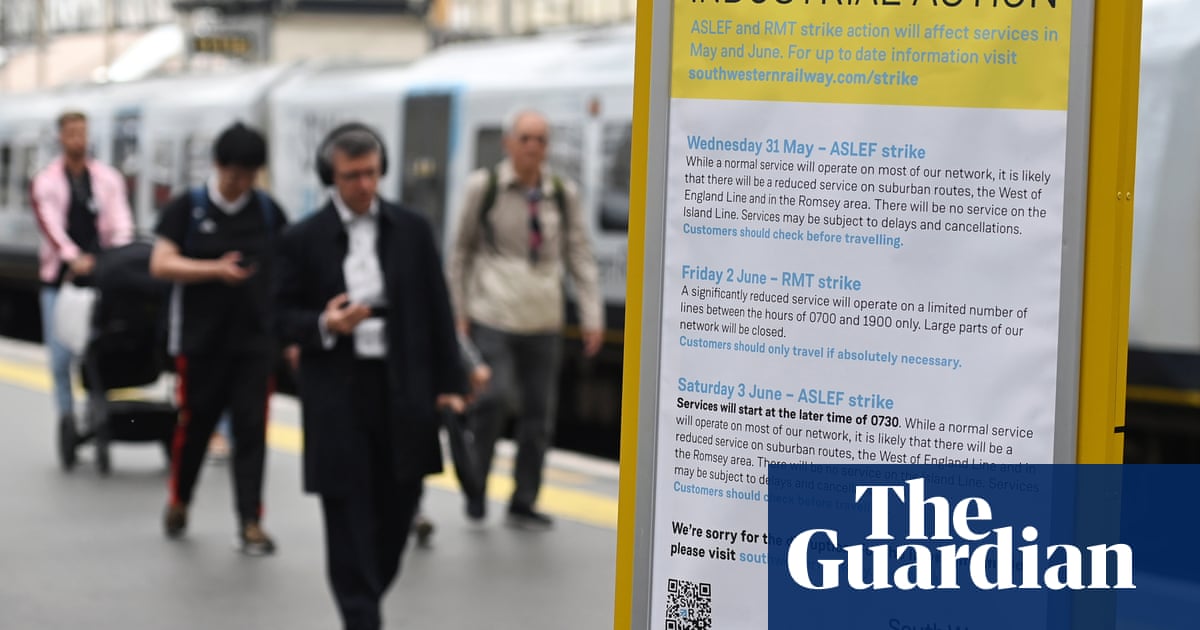
Passengers are bracing for 48 hours of significant disruption to train services in England starting on Friday morning as two rail unions go out on strike on consecutive days.
The first day’s action will see 20,000 rail workers belonging to the National Union of Rail, Maritime and Transport Workers (RMT) strike, followed by another day of action on Saturday by 12,000 train drivers who are members of Aslef.
Train operating companies have warned that rail services during this period will be “severely reduced with variations across the network and no services at all in some areas”.
On Friday, about 50% of services are set to run, while that figure is due to fall to about 40% on Saturday, when there will be no services on networks including Avanti West Coast, CrossCountry, Northern and Thameslink.
The RMT action is the latest chapter in a dispute with operators that began in spring last year and remains at a stalemate over pay, terms and conditions, and follows another Aslef strike that disrupted the Network on Wednesday.
Although affecting all train operators in England, Friday’s strike is likely to be less disruptive than the Aslef action, or earlier RMT stoppages that involved the union’s dispute with the track and signalling operator Network Rail, but will affect most services across England and some cross-border services into Scotland and Wales.
However, the latest strikes will cause particular headaches for fans travelling to the FA Cup final between Manchester City and Manchester United on Saturday in London, Beyoncé fans with tickets to her Renaissance tour at Tottenham Hotspur’s stadium, as well as parents planning half-term trips for the family.
The AA warned of busy roads and congested motorway services as a result, with fans of the rival Manchester teams allocated different service stations to make their stop-offs in anticipation of the greater mass of supporters set to travel down by road.
The RMT’s general secretary, Mick Lynch, blamed the government for Friday’s strike, accusing ministers of refusing to allow the Rail Delivery Group (RDG), which represents the train operators, to negotiate in good faith. “Ministers cannot just wish this dispute away,” he said.
“They underestimate the strength of feeling among our members, who have just given us a new six-month strike mandate, continue to support the campaign and the action, and are determined to see this through until we get an acceptable resolution.
“The government now needs to unlock the RDG and allow them to make an offer that can be put to a referendum of our members.”
The dispute with the train operators shows no sign of reaching a conclusion after the RMT received clarification in April that a pay offer of 9% over two years included a stipulation that strike action had to be ruled out as the negotiations continued.
The union firmly rejected this, saying the train operators had ‘reneged on their original proposals and torpedoed the negotiations.”. A mandate for six months of further strikes was won in May with a 68% turnout and 91% of votes cast backing strike action.
Steve Montgomery, the chair of the RDG, accused the RMT of “negotiating in bad faith, denying their members a say on a fair pay deal, needlessly disrupting the lives of millions of our passengers, and undermining the viability of an industry critical to Britain’s economy”.
The RMT’s separate dispute with Network Rail, which owns and operates track and signalling infrastructure, reached its conclusion in March when the union’s members voted overwhelmingly to accept an offer that included a pay rise of 14.4% for the lowest paid and no compulsory redundancies until January 2025.












